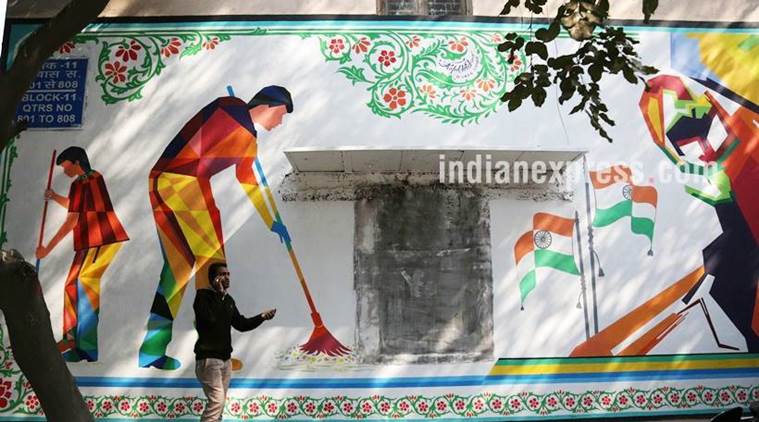 While the fund released in 2015-16 stood at Rs 1,076 crore, in 2016-17 it grew to Rs 2,037 crore. (Express Photo by Tashi Tobgyal)
While the fund released in 2015-16 stood at Rs 1,076 crore, in 2016-17 it grew to Rs 2,037 crore. (Express Photo by Tashi Tobgyal)
As the Centre pushes its Swachh Bharat Mission-Urban programme to ensure garbage-free cities via projects like solid waste management, toilet construction, conversion of waste to energy, among others, according to the Ministry of Housing and Urban Affairs data, a total of Rs 5,136 crore has been released to states and Union territories over the last three years.
While the fund released in 2015-16 stood at Rs 1,076 crore, in 2016-17 it grew to Rs 2,037 crore. For the year 2017-18, the amount disbursed was Rs 2,023 crore. The government data show that during the three-year period, the states that received the maximum funds were those governed by the Bharatiya Janata Party.
The list of top five states includes — Madhya Pradesh, Uttar Pradesh, Rajasthan, Maharashtra and Tamil Nadu. Gujarat and Andhra Pradesh occupied the sixth and seventh spot, respectively. While Madhya Pradesh comes on top with total fund received amounting to Rs 700 crore, UP follows next with an amount of Rs 580 crore. However, in 2017-18 alone, UP received Rs 497.7 crore, which is the highest sum received by any state in a particular year. While UP received Rs 82 crore in 2015-16, it did not receive any funds in the year 2016-17. Rajasthan occupied the third spot as it received Rs 533 crore from the centre in the three-year period.
Among the major states that have relatively lagged in receiving funds from the Centre for SBM-urban over the three-year period are Bihar (Rs 185 crore), Karnataka (Rs 166.9 crore), Telangana (Rs 147.7 crore), Haryana (Rs 99 crore), Punjab (Rs 65.5 crore) and Kerala (Rs 24.4 crore).
According to the data available on the ministry’s website, a total of 46.36 lakh individual toilets have been constructed under the mission against the total target of 66.42 lakh units. More than 3 lakh community and public toilets have been made against the target of 5.07 lakh. Also, more than 1,950 cities have been declared as open-defecation free.
Quantifying the success of the mission, the ministry further claims that 51,734 wards have achieved door-to-door waste collection while 7 waste-to-energy plants with a total capacity of 88.4 MW have become functional.
According to the data, a total of 56 waste-to-energy plants, with a total proposed capacity of 415 MW are under construction, and 1,64,891 metric ton of compost was produced from waste in 2016.
The government has been accelerating the implementation of Urban missions including the SBM-Urban. It recently came out with a guide book for Urban Local Bodies on Bulk Solid Waste Generator’s Compliance of Solid Waste Management Rules 2016, and online database for states and cities, both pertaining to Swachh Bharat Mission – Urban.
While the guide book lays out the roles and responsibilities of bulk waste generators and is aimed at guiding ULBs in implementing the SWM Rules, the online database can capture data (relating to their progress on SBM components) directly from states and cities online. Further, the government has also introduced the concept of a star rating protocol for garbage-free cities to enthuse a spirit of healthy competition among the cities.